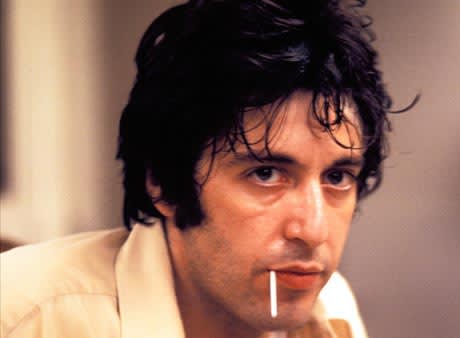Amongst numerous memorable moments in cinema history, some of the most iconic ones turn out to be improvised. (Dustin Hoffman's Ratzo Rizzo almost getting hit by a NYC taxi in Midnight Cowboy, which resulted in "I'm walking here!," is just one example.) Two such moments emerge in Sidney Lumet's 1975 classic Dog Day Afternoon: John Cazale's (as Sal) heartbreaking confession that, given the choice to escape to any country in the world, he would pick "Wyoming" is one; lead character Al Pacino's (as bank robber Sonny) invocation of the 1971 prison riot at Attica is another. Such are the fiery moments in film history that spring forth unwritten and unbidden from the minds of "in the moment" creators like Hoffman, like Cazale and like ultimate method actor Pacino. And in creations from smart, aware directors like Lumet (whose resume includes other moment defining works such as Network, Fail-Safe and 12 Angry Men), who frames the true events of an afternoon bank robbery in 1975 and crafts a work that shapes sexual politics, political motives and the appropriateness of police response in telling the story of two naïve bank robbers who let events they could control spiral away from them. What starts as a ten-minute heist by Sonny and Sal quickly devolves into a hostage situation that neither can escape, one that becomes almost instant national news due to an overwhelming police response and the network news coverage that follows. Complicating those factors is Sonny's relationship with his "wife," a gay man for whom he wants to pay for a sex change operation, as well as his real female wife and kids who know nothing of his secret life. Dog Day Afternoon remains fascinating and still compelling, 30 years later because of the inherent drama of watching Sonny and Sal pile bad choices atop unfortunate ones, and because of the reflection of the times the film portrays. But it is in its handling of Sonny's relationship with, and the characterisation of, Leon Shermer (Chris Sarandon, Susan's first husband) that Dog Day Afternoon now seems so forward-looking. Eschewing gay clichés, the confused love between the pair is at the heart-rending core of the film's conflicts. The tragedy, however, comes from John Cazale's Sal, a straight man (in several ways) to Pacino's clownish behaviour. A new two-disc reissue takes a retrospective look at the film, its impact and the ways in which it shaped both society and film culture; it's fleshed out by an intelligent Lumet commentary and a vintage look at his career. But the film itself remains the most poignant element, showcasing a young Pacino at the beginning of his "shouting as acting" approach and the immense talent of the tragically short-lived Cazale (whose only other film credits include The Godfather I and II, The Conversation and The Deer Hunter). (Warner)
Dog Day Afternoon
Sidney Lumet

BY James KeastPublished Apr 1, 2006